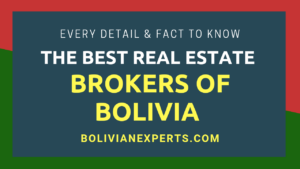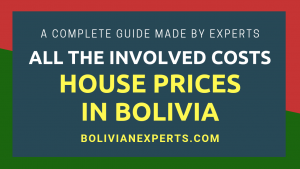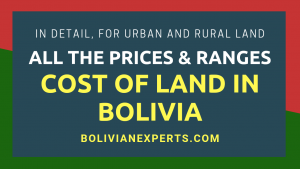Buying land in Bolivia is very similar to buying any other kind of property, and also the process you need to follow is almost the same as if you were a Bolivian citizen, but it has its own regulations. E.g., foreigners can’t buy rural land here, and tourists can’t buy any type of property. Also, there is an important risk of scams when buying a land lot in Bolivia, of which you need to be aware of.
To buy land in Bolivia you need to: 1) become at least a temporary resident 2) find the best land for you 3) do proper anti-scam checks, 4) pay the land sales tax, 5) sign the public deed of the land sale, 6) register your ownership in the Derechos Reales entity. Only urban land can be bought by foreigners.
Here we’ll talk about all the steps, risks, and regulations you need to know in order to buy land in Bolivia, with every detail, including the requirements, costs, and timeline that this process will require. We’re real Bolivian real estate experts who live in Bolivia and help many people here to achieve their goals in their real estate projects.
Warning: You can’t buy land as a tourist in Bolivia
If you are only a tourist in Bolivia (with only a tourist visa), you are not allowed to buy land or real estate property in the country.
Bolivia laws require that to have the rights and liabilities, be protected and regulated by the Bolivian law, you need to be properly registered and have your own Foreigner ID card, issued by the Bolivian government, and to get it, you need to be at least a temporary resident.
Almost all other types of visas, except for the Bolivian tourist visa, will allow you to become a temporary resident and obtain your foreigner ID document.
Once you get this document, you’ll enjoy all the rights, without any kind of limitation, that Bolivian laws impose on Bolivians, so you’ll be allowed, for example, to work here, open a bank account, do real estate, invest in businesses, buy stocks from the Bolivian stock market, and almost everything that a normal Bolivian does.
It’s a somewhat complicated process to get the Bolivian temporary residency status, you need a reason, for example, you’re going to work here, be part of an embassy or similar organization, or you are coming for health or studying purposes, etcetera.
We have a complete guide about getting a temporary or permanent residence, among other statuses in Bolivia, in the following direction: How to get a Bolivian residence, all the facts and details link.
After you get this residence status and obtain your foreigner ID, you’ll be allowed to buy many kinds of real estate in Bolivia.
The 2 types of land you can buy in Bolivia
After getting your foreigner ID document and becoming at least a temporary resident in Bolivia, you’ll be allowed to buy urban land without almost any limitation, but rural land won’t still be available for you unless you become a Bolivian citizen:
- Urban lands, you can buy them just by being a temporary resident.
- Rural lands, you can buy them only after becoming a Bolivian citizen.
1) Urban lands
Any property and land lot that is within an “urban area” is in this category. The urban area could be a major city in Bolivia or it could be just a little town that is classified as an urban area. People from overseas and expats can buy urban land lots without any restriction, as long as they are at least temporary residents. Urban land lots for both Bolivians and foreigners can’t be larger than 100,000 ft2 in extension (1 square).
There is an exception to this rule, people from other countries can’t buy any kind of either urban or rural property within the 31-mile-wide (50 km) frontier line of Bolivia. Then, in this frontier band, you as a foreigner are not allowed to buy any kind of property, no matter if it’s urban land, rural land, or any other kind of property.
2) The rural lands
Unfortunately, only Bolivians and naturalized citizens can buy rural land. There is no exception to this rule, then. Without being a Bolivian, you can’t buy any kind of property that is outside urban areas of Bolivia, no matter for which purposes you want it.
But there is a possibility of controlling rural land in Bolivia through a Bolivian company (Bolivian legal person) of which you are an owner in the form of a sole proprietorship, partnership, or stocks, but this rural land can only be used for business purposes.
The only workaround for this is to become a Bolivian citizen or make a shared risk contract with Bolivian business owners or land owners. We talk more about this in our dedicated guide about foreigners and the ways they have to buy real estate in Bolivia.
How to buy urban land in Bolivia?
Now, let’s talk about the general steps you need to follow to buy urban land in Bolivia. Keep in mind that this process is almost the same as if you were buying any other kind of property within our country, like houses, apartments, etcetera.
We have a complete guide about how to buy properties, including urban lands, in Bolivia in the next direction: How to buy a house in Bolivia? All the steps and risks. This guide is very complete, and it can be fully applied to buying land lots also.
Anyway, next we’re going to show you the general steps you need to follow to buy urban land lots in our country.
Warning: It’s pretty risky to buy land in Bolivia
Take into consideration that buying land in Bolivia is not that safe. There are a lot of risks here, and many scammers hide among legit land lot sellers. Also, there is an important risk of squatting and usucaption, which are huge illegal businesses here. Many people try to occupy abandoned land lots and get ownership of them as time goes by.
That’s why we deeply recommend you only buy land in Bolivia if you really know what you are doing. You’ll need to take a lot of legal advice and know how the legal procedures and real estate work here.
Anyway, the best land-buying process you should go through is the following:
- Buy the land lot with the best assistance and knowledge you can get (we’ll talk more about this later).
- Once you get the land lot, build inside it a little rental home.
- Rent this little home to a tenant that will also take care of the land lot. (You should always rent this home using a public deed for the rent and pay all the home rental taxes).
- Change your tenant every 2 to 4 years (longer than that, you may be at risk of usucaption).
- That’s all.
By following the above process, you’ll largely reduce the risk of being scammed, or being the target of squatting or usucaption in Bolivia. The key to this safety is that: 1) the tenant will avoid possible squatting and illegal occupations by his staying on the property, and 2) the public deed will keep apart the tenant himself from trying these unethical ways.
Also, remember that as a foreigner you can’t buy rural land, you can only buy urban land lots. We have a complete guide about this issue in the following link: Can foreigners buy property in Bolivia? All facts and regulations.
A) Requirements
The good news is that you’ll need almost the same requirements as any Bolivian to buy urban land lots in Bolivia. What will change is the use of your foreigner’s ID instead of a Bolivian ID document in the paperwork. Also, you may need to present your passport, visa, etcetera.
Beyond the mentioned documents, you’ll need to present others which will be the same as for Bolivians. Additionally, you’ll need to conduct the same paperwork that Bolivians do to buy urban land in our country.
The documents you’ll need are:
- The seller’s personal documents
- Your personal documents
- Folio Real (Translated: Link) of the land lot
- Informe Rapido (Translated: Link) of land lot
- Public deed (Translated: Link) of the land sale
- Land sales tax payment slip
- Proof of payment of “Derechos Reales” registrant services
- Cadastral certificate issued by the local city’s government.
- Approved plan of the land lot
All of these documents will be needed at a certain point of the paperwork to buy the urban land lot. Your legal assistant will give you more details about when these documents will be needed.
B) Steps
What you need to do first is come to Bolivia to buy the property. We deeply encourage you not to conduct this buying process through a representative in our country, while this may be possible, you are at a very high risk of scams and getting into legal trouble.
You should be present here in Bolivia for at least to: 1) see and prove the honesty of the seller and the land lot you’re going to buy with your legal assistants 2) sign the public deed of the land sale and 3) register your ownership of the land in the “Derechos Reales” entity.
The general process you’ll need to follow to buy an urban land lot is the following:
- Find a land lot that fits your needs, the location, the price, etcetera. We have a complete guide on how to find a property in Bolivia.
- Contact the seller through the realtor, bank, your representative in Bolivia, or by yourself.
- Do the proper verifications about the honesty and safety of the land lot and the seller. This is a very difficult task, follow our guide at the end of this section for more information.
- Deal and make a contract with the seller, this contract will be the public deed of the land sale. Only public deeds, signed by a public notary, are valid for real estate sales in Bolivia.
- Pay the land lot sale tax, the proof of this payment is a pre-requirement for the notary to make the public deed of the land sale. You’ll pay this tax to the city’s government.
- Only while you sign the public deed for the land sale, or after this event, you’ll need to pay the price of the land lot, and not before.
- Do the rest of the paperwork, which in Bolivia is usually the responsibility of the buyer.
- Do additional paperwork in the government of the urban area where the land lot is located.
- Register your ownership of the land lot in the Derechos Reales entity. This is a crucial step, only once you have registered your ownership in this institution, you can have the real security that the land lot legally belongs to you.
- Everything is done!
Remember that the above steps are general and this process is very time-consuming, and also somewhat difficult to carry out in our country. This process will normally take between 1 and 6 months to be finished, and the number of small tasks you need to perform will easily go over a hundred.
People in Bolivia normally spent between 100 hours to 300 hours to buy a property in Bolivia, including land lots.
Visit our detailed guide about how to buy a house in Bolivia to know every detail of the steps you need to follow, with all the precautions that you need to take, in the following direction: How to buy a house in Bolivia? Steps and precautions.
C) Costs
There are several costs attached to the procedures required to buy a house in Bolivia. These costs are of various types, including the sales tax for buying the land, the legal and notary public fees, the cost of the registration service in the Derechos Reales entity, the seller and land verification costs, along other similar ones.
But in general, the costs you’ll need to face are the following:
- Verification costs, including getting the Folio Real and Informe Rapido documents, the hiring of multiple third-party legal assistants in Bolivia, etcetera, ~$400.
- The land lot sale’s tax, 3% of the agreed sales price. E.g. if you buy a $20,000 land lot, then the tax you are going to pay is $600.
- The creation and sign of the public deed at a public notary office, ~$50.
- The Derechos Reales registration service fee, 0.5% of the agreed sales price. E.g. if you buy a $20,000 land lot, then this fee will be about $100.
- The cadastral certificate of the land lot, ~$30.
- The approved plan of the land lot, ~$30.
- Other miscellaneous costs, including transportation, food, accommodation, and similar things (for 1 month, not including the cost of your travel tickets for coming to Bolivia) ~1,000.
The total cost:
For the example above, which is a $20,000 land lot in Bolivia, the total cost will be $2,210, this represents 10% of the land sales cost, but it’s mainly because your staying costs in Bolivia are added.
We normally recommend to people in Bolivia that, for buying a property, including land lots, houses, or apartments, they should have from 4% to 5% of the agreed sales price of a house, in order to pay all the paperwork and the other attached costs.
But in your case it’s different, you need to add to this % your costs of coming to Bolivia and staying here while you go through the paperwork process and everything else, you can easily add to this percentage a fixed additional cost of between $1,000 to $3,000 to finish all the buying process.
Then, as a result, you’ll have the following cost structure:
- The cost of buying an urban land lot in Bolivia (which will be 4%-5% of the agreed sales price) + $1,000-$3,000.
Remember to avoid being overcharged by unethical people in Bolivia, professionals, and institutions. The costs presented above are the ones that usually Bolivians have, and these should be the same for you, maybe with some little overpricing.
D) Precautions
As we said at the beginning of this guide in regard to possible scams and legal conflicts when you’re buying land in Bolivia. You really need to be very careful about this aspect of the land-buying process. Bolivians take it very seriously as it’s very common to see real estate scams in our country.
This risk is even higher for you as you don’t know too much about real estate and the legal system here, then scammers will easily put you as a target of their illegal goals, expecting that you, as a foreigner, will be more vulnerable to their plans.
That’s why you need to address this issue and know how to really overcome the odds of being scammed. A very general approach to achieve this is going to be the following:
- Hire multiple legal assistants, at least 3 of them, none of them must know about the existence of the other ones (like a third-party verification). Each one of them must verify all the documents and the buying process on his own side.
- Get the best reference for ethical legal assistants, we only recommend your own embassy or the major Banks of Bolivia, where you can ask for these references.
- Consult the Updated Folio Real of the property, always ask the seller to give you the “Updated” Folio Real (the best approach is to get this document with a date of the same day on which you’re going to sign for the public deed). Also, you should ask the seller for this updated document when you are doing the verification process.
- Consult the Informe Rapido report of the property, you should always get this document when you are considering buying a land lot here.
- Consult, and let your assistants also consult, the Property Taxes of the land lot, the actual Cadastral Certificate, and the actual Approved Plan of the land, all these documents are critical for any piece of land.
- Always be present in 3 important steps of the buying process. 1) when you’re doing the verification for the honesty of the seller and the safety of the land lot you’ll buy. Here is where your legal assistants need to do the hard work! 2) when you are signing the public deed, and 3) when you are registering your ownership in the Derechos Reales entity.
- Always ask the public notary to review the documentation and the paperwork of the sale before he makes the public deed and you sign it.
- Make a technical inspection of the land lot you’re considering buying with the help of professionals like an architect or a civil engineer in Bolivia.
Keep in mind that these are only general precautions to take against possible risks here.
Anyway, in our Buying a House in Bolivia detailed guide, you’ll get more detailed insights about this issue, and the most important precautions you need to take to avoid scams and unethical people here.
How to buy rural land in Bolivia?
Through this guide, we have been talking only about urban land you can buy in this country, but if you want to buy agrarian land or rural land for agriculture or production purposes, you’ll have a hard time trying to accomplish this in Bolivia.
The normal way to achieve this is only through one option:
- Becoming a Bolivian citizen. This is not that easy. We have a guide link about this.
But you also may have 2 workarounds for this issue:
- Create a Bolivian legal person (a legal company registered in Bolivia, but this company needs to be Bolivian), and be the owner of this company through a partnership, stocks, or sole proprietorship. Then you’ll be able to manage land in the country, but only for the production purposes of your company.
- Sign a shared risk contract with a rural land owner in Bolivia. Again only for production purposes. Currently, there is a legal void in this option; the proper detailed laws for it haven’t been realized yet and this situation is the same since many years ago.
But if you want to buy rural land to live in such property, or to conduct activities other than production, your only way to get it is to become a Bolivian citizen.
We have a complete guide about whether people from overseas can or not buy property in Bolivia, including rural lands. Visit this guide in the following direction: Can foreigners buy property in Bolivia? All the regulations.
How to sell land in Bolivia?
The selling process of a property or land in Bolivia is very similar to the buying process, as the same documents need to be presented to the same legal institutions, like the Derechos Reales entity, the local government, the notary public, and the legal assistants.
If you know how to buy land in Bolivia, you’ll certainly know how to sell it. The main differences in the buying and selling process are:
- Generally, the seller of the land lot doesn’t care about the procedures anymore after the public deed for the sale is signed, doing the additional paperwork is the responsibility of the buyer.
- The buyer is the one who pays the land sales tax, not the seller.
- The seller needs to know how to announce his land lot for sale, he can do it with the help of a known realtor available in Bolivia, like ReMax or Century 21.
- The seller is the one who pays the commission to the realtor (this commission is around 2% to 4% in Bolivia).
We have an ultimate guide about how to sell properties in Bolivia, which is written in Spanish. This guide can also be applied to selling urban land lots. You can see it in the following direction: (Translated: Link).
Conclusions:
In this guide about how to buy land in Bolivia, you’ve realized that there are 2 types of land properties in our country, urban land and rural land, of which only urban land can be bought by foreigners.
You’ve learned the general steps involved in buying urban land in Bolivia as a foreigner, like making pre-verifications against scams and dishonest people, hiring the proper legal assistance, dealing with the seller, making the public deed, paying the land sales price, paying the taxes for the sale, registering your property in Derechos Reales, and doing additional paperwork in the local city or town.
Also, you realized the precautions you need to take to avoid scams when buying an urban land lot in Bolivia, like hiring multiple legal assistants and lawyers, being physically present at certain points of the buying process, making the proper pre-verifications, signing a public deed for the sale at a public notary and register your ownership in Derechos Reales, and so on.
We hope this information has helped you, and if you want to know how much land really costs in our country, visit our dedicated guide in the following direction: How much does land cost in Bolivia? All the numbers and details.
BolivianExperts.com, information about how to live, work, invest, and travel in Bolivia.








